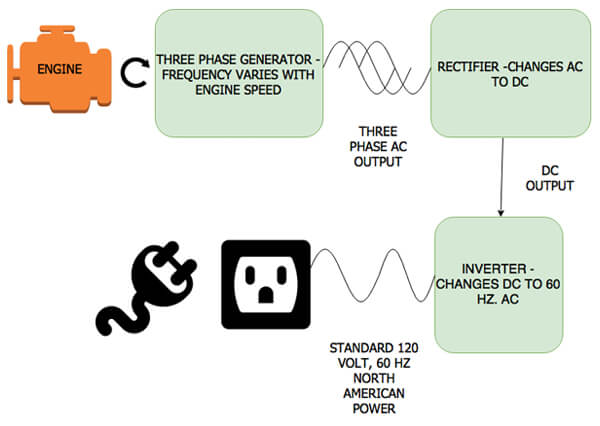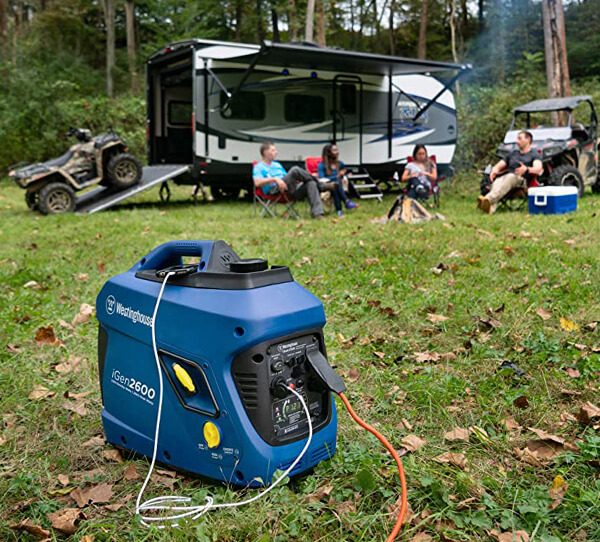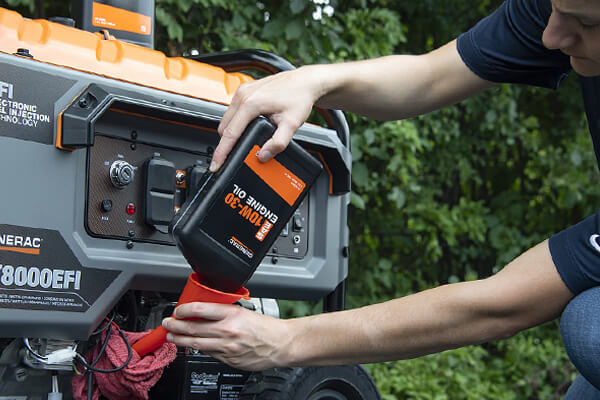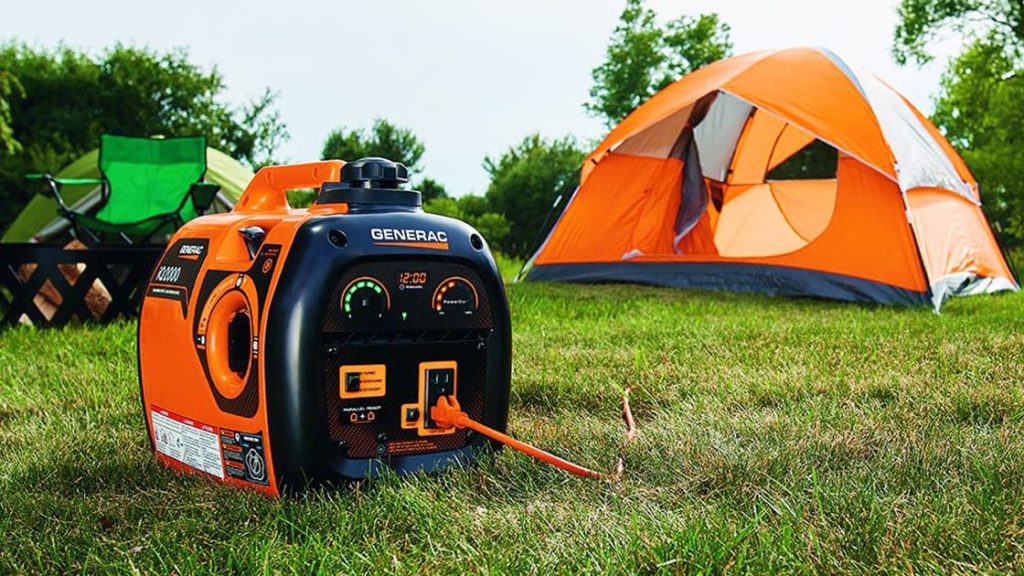Introduction
An inverter generator is a type of portable power source that can be used for many different purposes. It converts the frequency of the alternating current to direct current, which makes it compatible with most appliances. It is typically quieter than an engine-driven generator and has lower emissions. You may wonder what are some common uses for an inverter generator?
An inverter generator can be used in the event of a natural disaster or power outage to provide electricity to your home or office when you need it most. They can also be invaluable in camping trips when you want access to electrical devices but still want the peace and quiet that comes with being outdoors. As long as there’s an outlet nearby, you’re all set.
The main drawback of inverter generators is their higher price compared to standard models but these prices have been dropping over the past few years as demand has increased along with awareness about this technology and its benefits.
However, with their outstanding advantages, inverter generators are still the perfect choice for those who want power without having to endure noise or smoke. Now, let’s find out the information as well as the features and benefits of this generator.
Related:
- How to maintain a generator
- Inverter Generator Vs Generator – Which Type Should You Buy?
- How to reduce generator fuel consumption?
What is an inverter generator?
First, an inverter generator is a portable power source that uses an electric motor to convert mechanical energy into electrical energy. This type of generator produces clean, stable electricity and can be used for many different applications both commercial and residential. The output voltage varies depending on the load placed upon it but generally falls between 120 volts AC 60 Hz (household current) or 240 volts AC 50/60 Hz (industrial power).
An inverter generator is a new breed of the gas-powered portable generator that produces cleaner and quieter power than traditional generators. Instead of producing power conditions like traditional generators, inverter generators produce the same type of power you get from your home electrical outlet (with some exceptions). The power output is called “true sine wave” which closely matches the voltage and hertz requirements of most electronics and appliances.
Inverter generators have sophisticated microprocessors that control both the voltage and timing to keep their output in line with what it should be for reliable operation. This means that they can not only run more sensitive equipment without problems but also require less maintenance in general because there are fewer moving parts in an inverter generator when compared to a traditional generator.
However, an inverter generator is not perfect, so there are some limitations on what you can run with it – but the new features and design of inverter generators have completely changed how they are being used, so people are taking advantage of these new capabilities.
Typically inverter generators are smaller than traditional gas-powered portable generators, which means that they’re easier to store away when you’re not using them. They also tend to use less fuel, which makes them more economical because you don’t have to refill them as often, but this topic is hotly debated among users.
Some really like their inverter generators because they produce cleaner power for sensitive electronics while others prefer the more robust “dirty” power produced by a traditional gasoline generator.
How does an inverter generator work?
Inverter generators use a brushless generator and electronic circuitry to regulate power output so it’s consistent. Inverter generators produce 2 different types of voltages: 120 volts “household” voltage, and 240 volts industrial voltage.
To convert household current from the generator to industrial current, industrial equipment uses an inverter peak system, which is explained below. To get industrial voltage from house power the device would need a dedicated 240v-to-120v inverter, a process that can be quite expensive for most people.
The diagram above shows how household electricity goes through the low-voltage side of the unit into a rectifier where it then becomes 120 or 240 direct currents (DC), depending on your setup. It then goes through a voltage multiplier circuit that determines the output voltage. Inverter generators can be set to produce anywhere from 120 volts DC to 240 volts DC as needed, depending on the needs of the equipment you’re running.
When you connect your device to an inverter generator it will not receive AC power directly from the generator but rather a steady stream of direct current (DC) at a specific voltage setting selected by you.
In general, most electronics and appliances cannot handle the larger voltages produced by traditional generators. To fix this problem, manufacturers started adding electronic circuits that regulate input from the generator so their equipment would operate properly with these fluctuating power sources – these circuits are called “inverters”.

How does an inverter generator work (cre: offgridham.com)
Why are inverter generators so expensive?
The truth is that while there are new motors and other components in inverter generators that have separate benefits over traditional generators, none of these differences have anything to do with how or why they produce cleaner power. This means that the debate among users whether inverter generators produce “better” power than traditional gas-powered portable generators is essentially misguided because all modern gasoline-powered portable generators create clean and safe (and quiet) electrical output.
In fact, the only difference between true sine wave generators and traditional gasoline generators is that inverter generators have been optimized for efficiency so they use less fuel when producing the same amount of power (and produce cleaner power to boot).
So if it’s not the type of power that makes an inverter generator expensive then what really causes their high prices? It turns out to be a combination of different factors.
For one, inverter generators typically require more components and electronic components cost more than mechanical components, which makes them inherently more expensive (for example an alternator creates AC current while a motor creates DC current – but it requires far fewer electrical components to turn DC into AC). But there are other factors at work too including marketing and target audience.
Inverter generators are generally smaller and lighter than traditional generators, which means they appeal to a more specific customer. This also makes them more expensive because they require a higher initial investment for manufacturers to justify their development costs while still maintaining profitability. So although inverter generators cost more money – it’s important to realize that this is relative when you compare them with other modern alternatives.
Benefits of Inverter Generators
The biggest advantage of inverter generators is for running sensitive electronics – so if you have electrical devices that can’t handle traditional power sources, an inverter generator will be a good investment. Also because they produce smoother sine waves using sophisticated circuitry, inverter generators are less likely to damage electronic equipment even during brownouts or other types of fluctuations in the power coming from the source.
If you’re planning on using your generator infrequently and mainly to power equipment with sensitive electronics, an inverter generator may suit your needs better than a traditional gas-powered unit.
On the other hand, if you require remote access and portability of a portable power source more than any of the extra features offered by inverter generators, but still want cleaner output, then a traditional gasoline-powered portable generator might be a good option for you.
Inverters are typically more expensive than traditional generators, often two or three times the price – but they can save money in the long run because they use less fuel. Inverter generators are also more expensive but they tend to be smaller, lighter-weight, need less maintenance, and use less fuel.

Inverter generators are a great choice for travel or camping
Pros and Cons of Inverter Generators
Inverter generators have many advantages over traditional gasoline-powered portable generators, but there are some limitations that may or may not be an issue depending on your needs:
Pros
- They produce clean power by using sophisticated microprocessors that adjust the voltage and timing so your sensitive electronics don’t malfunction.
- They use less fuel to produce the same amount of power as traditional generators – which is an advantage on its own.
- A secondary battery charge port allows you to double your run time by keeping a charged backup on hand for when your first one runs out.
- Some models are manufactured specifically for light or medium-duty tasks including running small tools or providing power for construction sites.
- Inverter generators don’t require any special maintenance like traditional generators.
- They can be run indoors without venting because they don’t emit carbon monoxide.
- With lighter weight inverter generators are easier to move than conventional generators, which makes them a great choice for travel or camping.
- The noise level is lower so it can be used in residential areas without disturbing your neighbors.
Cons
- Inverter generators typically cost more than traditional gasoline-powered portable generators, but not always. Their cost makes them inaccessible to most people who might want one, despite their practicality.
- They can be more difficult to repair than some traditional generators because of their electronics-heavy design (though there are still serviceable parts). When they fail it’s usually more costly and difficult to replace only the failed component – so it’s easier to buy an entirely new generator than to try and fix it.
- The AC power output is more efficient but may not be compatible with some older appliances/equipment.
- Inverter generators can be difficult to start in cold weather because they require higher-quality fuel due to the sensitive processor inside.
Why buy an inverter generator?
Let’s say you had some really sensitive equipment that needed the cleanest power possible from a portable gas-powered generator. If you can afford it financially, sure… use an inverter generator!
Inverter generators have been known to last up to 30 years if taken care of properly so making an investment should pay off in the long haul.
They can run just about any 120V/240V appliance in an eco-friendly manner while providing quiet operation and minimal fuel consumption.
However, inverter generators are not designed to run tools or other heavy power-hungry equipment for extended periods of time – if that’s what you want then go with a heavier wattage model.
Another common problem with inverter generators is batteries – which are expensive but can be easily charged at home before you go camping or take your generator on the road. If you’re only using an inverter generator for emergencies then this isn’t much of a concern, but campers and others who need to travel with their equipment might want to spend the extra money for an inverter that has a battery included.
Inverter generator with quiet technology
Types of inverter generators and their benefits
Inverter generators have a wide variety of features depending on the unit’s voltage and capacity. Units for small electronics use a sine wave inverter, which produces cleaner electricity but is more expensive than those used for larger appliances.
For those working with sensitive electronic equipment, using inverters specifically designed to work with these devices can mean the difference between life and death – literally. Inverters that produce 120v household power are often called “modified sine” or “square wave inverters”. They’re very inexpensive compared to other types of inverters because they lack the sophisticated circuitry needed for producing industrial voltage levels. For example, if you were running a computer off this type of generator it would probably be destroyed in about an hour or two.
Although square wave inverters are definitely unsafe for sensitive electronics, they still work great for powering things like small air compressors, power tools, and lighting equipment – you can also use them to recharge batteries. For construction workers who need temporary access to the site without all the hassles of traditional generators, these units are perfect because they’re lightweight and quiet compared to gasoline-powered units. They’re also much more portable than larger liquid fuel or diesel models.
Once again, if you’ll be running very large items (anything over 2000 watts) an inverter generator is not the correct choice because it won’t have enough power. If you intend on using one regularly in situations where it will be run at or near capacity you should get a liquid-fuel generator instead.
Overall, there are very few electronic devices that can’t handle pulsing DC electricity and inverter generators produce it extremely well – but they’re expensive for this reason. If you intend on running sensitive electronics through your generator, an inverter model is a way to go. However, if you don’t need to run exactly 120 volts at any given time – which will probably be the case with most household electronics – then investing in a modified sine wave inverter generator would be good enough.
Tips for proper use and maintenance
There are several things you should keep in mind when it comes to the maintenance of your inverter generator. Because these machines don’t require daily checks and oil changes like traditional gasoline-powered models, you might be tempted to skip this step. However, make sure you get used to using a multimeter every once in a while (the frequency at which you will need to do this depends on how often and for how long your machine runs) since it is one of the best ways to detect early signs of failure.

Periodic inspection and maintenance of inverter generators
According to experts, running an inverter more than 20 hours per week will reduce its lifespan substantially. Even though it’s more expensive than buying a new machine, replacing worn-out parts can extend its life by many years if done properly. Keep in mind that inverters come with a manual that contains detailed information on how to perform all maintenance tasks. Checking and applying those steps will help you improve the performance and durability of your machine.
You should also be careful about what kind of fuel you use: Although most inverter generators can run well on different kinds of gas, using high-octane fuel is always recommended since it makes them more efficient and increases their lifespan significantly.
So if you’re looking for something useful to use during blackouts or other situations that might demand power, then an inverter generator is certainly a great choice. They’re relatively easy to operate, not too noisy, very portable and they don’t require too much gas to keep running for hours. And the best part? You don’t need to be an expert in order to use them properly.
The Bottom Line
Picking out the right inverter generator is all about knowing what you want to accomplish with your purchase. If you require something more portable for camping trips or temporary power outages, then a smaller, low-wattage device will work just fine. On the other hand, if your main goal is to get an AC power source for construction projects or extra electric appliances at home then larger, more powerful models are best for maximizing efficiency and costs. Either way, one of these devices will help make life easier by eliminating headaches associated with electrical malfunctions and keeping you connected during major emergencies like hurricanes, floods, and tornadoes.
Thinking about purchasing an inverter generator but confused about which one is best? If so, then this guide should help you understand what makes each model unique while providing valuable information.
I hope this information about inverter generators is useful to you. Leave me a comment in the section below. I will get back to you as soon as possible!
Thanks for reading 🙂



